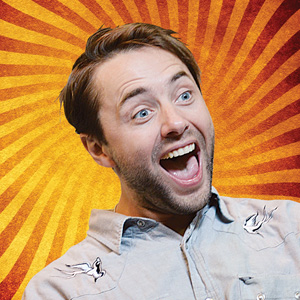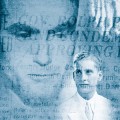On my way to meeting Vincent Kartheiser, I feel underdressed. As Pete Campbell on AMC’s Mad Men, Kartheiser exudes some of the slippery polish of Patrick Bateman from American Psycho, all sharp angles and murderous, WASP-y bite.
I naively expect the real-life persona to skew eerily close to that image, which is meant as a compliment, but could easily be diminishing. He is neither flattered nor insulted.
He’s fascinated.
“What I find very interesting is people’s need to project,” Kartheiser tells me over a slice of pizza. “It’s not good or badóit’s just interesting,” he says with a wide grin.
Moments earlier, the actor was rehearsing backstage at the San Jose Repertory Theatre for The Death of the Novel, the play he’s headlining (previews begin Aug. 30) about a disillusioned young author buckling under the pressure of a second novel.
Today’s scene revolves around a therapist’s couch, and Kartheiser’s Sebastian is bandying aggressively with his analyst, answering questions with just enough bait to lure in his subjectówhich is supposed to be him.
Kartheiser seems attracted to characters with open wounds, almost sadistically. The actor has been steadily working since he was barely in the first grade, but he’s received the most attention, favorable and otherwise, for his role as Pete, the sniveling but sometimes sympathetic man-child whose self-interest is almost Ayn Rand-ian in nature.
For his character in The Death of a Novel, Kartheiser is working against a backdrop of despair. Novelist Sebastian was 15 during 9/11, and for the rest of his life, he mournsófirst the loss of his parents by the time he’s 20, then for the loss of his identity.
“You have to paint the picture of a man who has no one left,” Kartheiser says. “So he’s written this novel, and the world loves him and thinks they know him. You think you want women to love you for what you do [but] it’s strangely very sad when a woman wants you because of what you are, not who are.
“There’s a disconnect and a bitterness that comes with that. He’s found a way to not leave his apartment, to not deal with human emotion, to not subject himself to possible catastrophe, to avoid being around those sorts of things, people dying, by people who love him and totally misinterpret his work.”
“We live in crazy times,” Kartheiser explains. “And Sebastian has a kind of defeated point of view that America can relate to. You feel helpless to do anything about these big problems in the world. There’s a lack of hope, and an idea that you can draw into yourself and live life in a box. You go back a hundred years ago and realize it would have been impossible to be an agoraphobic,” he says, laughing.
I ask Kartheiser if he in turn feels hopeless and considers acting as a way to give hope. “I think I can give people hope, but I don’t know if I want to,” he counters. “I understand how one can be hopeless.”
‘That’s Wild, Man’
For a show like Mad Men, the world lacks binary partitions of good and evil. And according to Kartheiser, the disgust that we feel for Pete and the rest of the cast is yet another projection.
“I think people with issues about Pete aren’t aware of all the bad things they do in their own lives,” he says.
At this point, he looks up. “Are you always doing good?”
No, I tell him.
“Neither am I. And I’m aware of it everyday,” he continues.
Is it possible to strive for good? “You really think there’s someone out there who does good all the time? Really?” He pulls back, smiling and slams the table gently. “That’s wild, man. That really is.”
“Our characters have flaws! This somehow surprises people,” he notes. “[On Mad Men], people want something we’re not going to give them. They want all the people to be good characters, like on Cheers. But our show is about how the world is in constant reaction to what’s around them, to life. Sometimes, it has less to do with our personality than our circumstances.”
I wonder if the Kartheiser’s cynicism is a product of his work, and we discuss a Kurt Vonnegut quote he’s enamored of. “‘Watch out for who you pretend to be, because you are who you pretend to be.’ Yeah, that’s a dangerous quote for an actor to read. Because I spend my life fabricating emotions and personalities. You find yourself sometimes acting in real life. But don’t we all?”
In person, Kartheiser is intense, but a little beautiful and so lucid that it would be impossible to imagine him doing anything but acting, what he calls “manipulating emotions.” Stepping outside, he wears the expression of someone fresh from rehab, enchanted by the world around him.
“I like San Jose. People seem happy to be alive here,” he muses, noticing a group of happy-go-lucky transients making small talk on the corner of South Second Street. We discuss the relativity of success, something Kartheiser is all too aware of.
“There’s that line from Mad Men: ‘Do you know what happiness is? It’s the moment right before you need more happiness.’ That’s what success is, but you’re not fulfilled. For me, I’ve always wanted to be an actor, and the scariest thing is now that I am, I’m actually accountable for what I say and do.”
He adds, “There’s a lot more responsibility, and a longer ways to fall.”
He squints, his eyes dim. “I know that a small percentage of people who come to see this play are saying, ‘Hey, let’s go watch this TV actor fall on his face.”
That strikes me as a little vainglorious, or at least, defensive. Before I can think too long, he poses a surprising question:
“Why are we as a society so obsessed with Kim Kardashian?”
“I have my theories,” I say with an uncomfortable laugh.
“No, no, I’m seriousówhy? Because we want to judge her. There’s a reason why the People magazine that says, ‘He lied, he cheated!’ sells more copies than ‘Love, they’re in love!’ We want to open it up and say, ‘What a despicable asshole.’”
He continues, “Entertainers and famous people fill a role, to alleviate the stress of human beings and their own judgments of themselves. It’s like the Greek myth of Bacchus where you trample [someone] under the hooves, and then you have a feast. You pick one person, and then you destroy them. And if you’re not ready for that, you shouldn’t be an actor. Because that’s our roleóto help people learn how to live, to entertain, to distract. But it’s also to be trampled under our feet by society, to take the hit,” he explains.
“Mostly, we do it happily.”
He adds, “I don’t hate reality TV. I don’t hate Kim Kardashian. I watch reality TV! Mostly I’m interested in what this type of escapism says about our societies. Like, why are there so many superhero movies?”
Power of Escapism
Maybe escapism is necessary.
“Dude, absolutely. And we should be allowed to be entertained by anything. And we live in a world where we watch so much TV, people become experts. They are, technically. But they don’t really know what they’re talking about. It’s like my opinion of dentistry.” He puts on a voice. “Uh, yeah, those caps don’t look so good! Yeah, sure.”
“Every day, I’m out, eating a salad alone, and I hear these people say ‘Oh, this movie sucks; this actor is shitty,’ and even if those opinions aren’t trained, I have to let that go. They have a right. I in turn don’t have an opinion of their opinion. I can’t,” he says.
But I wonder if the actor enjoys the thrill of failure, if criticism motivates him.
“I wouldn’t know how to survive anymore without some impending fear driven moment in my future. The idea that I’m going to be up on stage in 10 days with this character fills me with a gang of emotions. And accessing those areas of darkness and profound feeling, not only for this character but who he cares about, and the world …,” he says, his voice suddenly quieting.
“I refuse to live without those emotions, without those heightened moments of transcendence. Life’s empty otherwise. How do you go and climb Mt Kilimanjaro and then go walk around your neighborhood? You need another mountain to climb,” he advises.
In the open street, Kartheiser is virtually unrecognized. He’s loud and effusive, and just the sort of person you’d stop to watch even if he weren’t on a critically lauded television show. The darkness of his characters is informed by their relationship to the world, a relationship Kartheiser cherishes.
“I can’t imagine not having this affect me. There are lots of emotions we’re suppressing, things that happen outside are terrible, and we desensitize ourselves to the horrors of live because you can’t live in that emotional place. But as an artist, you can’t but live in that place. That’s your only job, to be an observer, to truly see what’s going around you,” he says.
With that, I watch him rise from the table, step outside and light a cigarette. He turns back with a smile. “I have to get back to work.”

 Vineyard to market: Poppy Farm Home & Garden
Vineyard to market: Poppy Farm Home & Garden  Zona Rosa opens on the Alameda
Zona Rosa opens on the Alameda 


